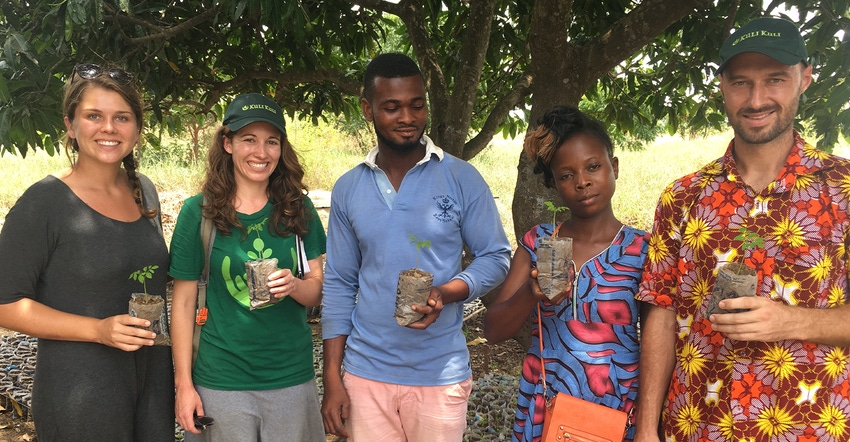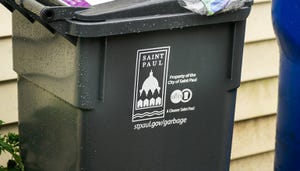Kuli Kuli Grows a California Business While Expanding U.S. Market Access to African Women Farmers
Since she was young, Lisa Kurtis, Kuli Kuli Foods founder and CEO, has been on a mission to change the world. Her superfoods brand works with women farmers in Africa and is in more than 11,000 stores across the U.S.

A trip to Niger led a young female entrepreneur to launch a sustainable superfoods brand now sold in 11,000 stores across the U.S. Founder and CEO Lisa Curtis tells how she built the business to be able to partner with small farmers around the world.
She reveals a surprise that came from a lifecycle analysis and what Kuli Kuli has changed from this unearthing. Curtis also has a proposition for other food manufacturers.
Waste360: Tell us about your earliest work in the world of sustainability and your onward journey
Curtis: I’ve been focused on trying to make the world a better place since I was about age 10 when I co-wrote an essay with my childhood best friend about recycling. It won a competition and as I was celebrating with an ice cream sundae, I decided that saving the environment was pretty sweet. By high school I had started a recycling contest with Cans for Habitat that raised thousands of dollars to build low-income homes. I expanded my reach globally in college as the UN Environment’s U.S. youth representative at international sustainable development conferences. I sought to gain a firsthand understanding of the challenges of living off a dollar a day by joining the Peace Corps. While serving in Niger, I found myself feeling sluggish from a diet of mostly rice. Women in the local community advised me to eat moringa leaves, showing me how to mix them into a local snack called kuli-kuli.
While moringa was recognized locally for its medicinal benefits, farmers saw no reason to grow it without market demand. I was inspired to find a market-based solution to realize moringa’s potential as a powerful tool for nutritional health and expand U.S. market access to African women farmers. I returned home to the U.S. and built Kuli Kuli Foods.
We’ve since grown our products to utilize other climate-smart crops such as baobab, hibiscus, and cacao.
Waste360: How do you work with farmers in remote parts of the world from your California headquarters?
Curtis: Kuli Kuli sources from small farmers across 10 countries. We have a relatively small team. We rely heavily on our suppliers, and endeavor to form win-win partnerships where they focus on growing and processing quality products, and we focus on marketing and selling these superfoods in the U.S.
The pandemic impacted our supply chain tremendously in 2020 and 2021, making it difficult for us to receive product and it also raised shipping costs enormously. So, we started sending our African ingredients to a processing center in Germany to undergo the final stage of processing and to consolidate them into the largest possible shipping container. This was a win from a carbon perspective, and also a win for the farmers as we’re now able to pay them much faster.
Waste360: What did your lifecycle analysis uncover? What have you changed since then?
Curtis: Kuli Kuli partnered with Yale’s Graduate School of Forestry to conduct a carbon audit a few years ago. We went into the audit believing that our largest source of carbon emissions was the transportation of ingredients from countries like Uganda and Mozambique to California. We were surprised to learn that our largest source of emissions was actually from our packaging. We were excited to learn that based on a cursory look at our emissions and the offsets produced by planting moringa trees, the Yale students believed that we were close to carbon neutral. Still, we decided to focus on making our packaging as sustainable as possible.
Our first challenge is that to maintain our products’ long shelf life we needed packaging with a firm barrier. We were also disheartened to learn that most Americans don’t have access to industrial compost, and thus the majority of compostable packaging ends up in landfill. We partnered with Fortis Solutions Group, a certified green printer, to find the most sustainable packaging possible. We ended up using a 50 percent post-consumer recycled pouch and have now switched 95 percent of our packaging to this pouch. Though we are a small brand, Fortis told us that we’re their largest purchaser of PCR pouches. We’re proud that we’re diverting the equivalent of 180,000 water bottles per year through our packaging.
Waste360: How do you invest in communities and what’s come of this commitment?
Curtis: Kuli Kuli was super excited to launch our Farmer Community Impact Fund in 2023 to invest $20,000 annually into community projects that our supplier partners identified as needs in their communities. All of these projects needed to meet our commitment to social and environmental sustainability. For example, we financed a project in Ghana to grow a sustainable agroforestry program on our partner’s organic solar irrigated nucleus farm. Farmers planted vegetables, grains, and staple crops alongside our moringa trees to support healthy soil, improve biodiversity, and increase farmer income.
Over the next decade, this grant funding alone will lay the groundwork for $80,000 in direct farmer income and plant 3,600 trees.
Other initiatives include a rainwater harvesting system at a local school, moringa nutrition programs, a solar installation, and worker housing to reduce commute time. It’s been amazing to see how far a relatively small amount of money can go in places like Uganda, Ghana, and Mozambique.
Waste360: What can you say about failure and what you have learned from it?
Curtis: My most frustrating failure was when Kuli Kuli launched a new dark chocolate superfood snack that we believed had potential to grow our business significantly. We had an original vision for this product that proved impossibly expensive. We were forced to make lots of changes, such as not using the highest quality chocolate (we did ethically-sourced chocolate but not Fair Trade), and also not using sustainable packaging. Ultimately the product failed, and I think part of that failure was because it didn’t live up to our values.
Going forward we’ve built a “sustainability check” into our product innovation pipeline so that we’re not manufacturing anything that doesn’t fully meet our high standards.
Waste360: What does success look like to you?
Curtis: Success to me is system change. As our climate changes and our global population grows, we must find new sources of nutrition. Kuli Kuli’s vision is to pioneer the plants of the future in the U.S. market. Our mission is to turn climate-smart, community-grown superfoods into staple foods, enabling us to generate income for thousands of farmers while fighting climate change. And to continue to partner with local entrepreneurs to create sustainable supply chains that provide nourishment, livelihood, and reforestation around the world.
Waste360: How do you see food and beverage manufacturers positioned to address climate change, and what is in it for them to do so?
Curtis: I really believe that food and beverage manufacturers have a huge role to play when it comes to addressing climate change. We’re uniquely positioned as we have direct ties to agriculture (a huge source of emissions) and create copious amounts of waste through our packaging. Kuli Kuli is proud to be a part of an industry group called OSC that has a collaborative focused on sustainable packaging. I’d like to challenge more brands to think hard about the ways that they are sourcing and packaging their products. Consumers want the products they consume to have a positive impact on the world, and I believe brands can grow faster if they invest in sustainability.
About the Author(s)
You May Also Like




